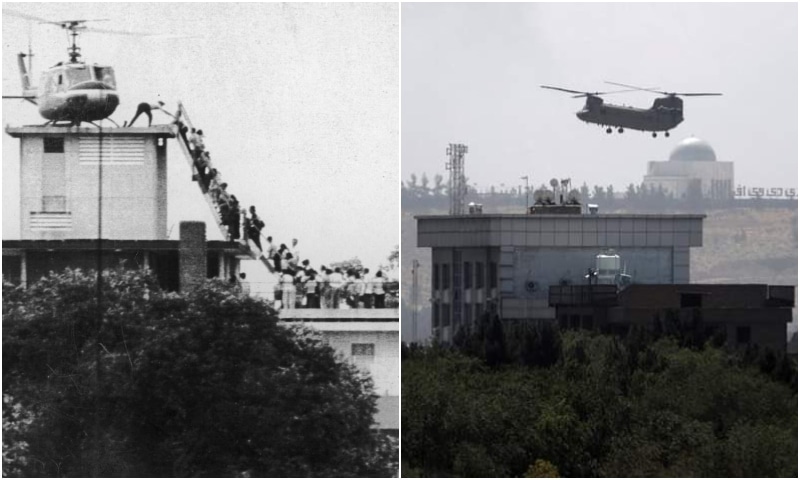The Biden Afghan Departure: Historical Images and Memories
The Biden Administration decision to withdraw from Afghanistan and removing the U.S. military and support for the Afghan Air Force has been followed by a rapid takeover of Afghanistan by the Taliban.
Such an historic event generates images for the living and for future generations.
The most viewed image in the United States is the parallel to the escape from Saigon.
The pairing of images of the escape from Saigon and from Kabul does obscure a significant difference in how this happened.
With regard to the Saigon events, it was generated by the Democratic Congress pulling the money from the executive branch which was working with the South Vietnamese forces.
This time the Democratic executive branch made unilateral decisions about withdrawing and acted on their plans.
It was an executive branched “planned” withdrawal.
But for European allies, the images are differently historically.
For the French, the historic images are also built on their post-war military engagements, ranging from Indochina to North Africa.
I discussed this with French native and co-founder of Second Line of Defense, Murielle Delaporte. Delaporte is the editor of Opérationnels SLDS, a Paris-based defence quarterly she founded in 2009.
Question: What images come to the various generations in France with regard to the entrapment of civilians, and the contested withdrawal from Afghanistan by the Americans?
Murielle Delaporte: For my parents’ generation, the images of Dien Bien Phu (1954) are vivid. Here the French government negotiated with the enemy while the French Army was fighting for its life.
The French military had asked for help from the United States, but were left in large part abandoned to their own fate.
The parallel with Kabul’s fall today is striking in the sense that it highlights the gap – or even antinomy – between the political logic of negotiating and the military logic of fighting.
Announcing in advance that you are leaving on a very specific day is already giving ammunition to the enemy.
And drives a significant sense of betrayal and resentment from the veterans has to be felt under such circumstances.
The second image which is shared by my parent’s generation and the first segment of the post-war generation is the Suez Crisis (1956).
Here the British and the French worked with the Israelis against the Egyptian takeover of the Suez Canal.
Again, the United States not only did not come to the aid of the two allies but took the side of the Egyptians and the Soviet Union and enhanced a sense of U.S unilateral decision making – as well as great power order feared during the Cold War – with little consideration for allies.
The nuclear program already underway in France was indeed accelerated in response to this event.
These historical events reinforced the French Gaullist instincts to promote independence from the Americans, which can be seen today in the Macron government.
The current Biden Administration approach certainly will reinforce these historical images and experiences.
Question: This certainly will as well reinforce for the British and the French of having an independent nuclear deterrent?
Murielle Delaporte: It is already the case, but it might deepen the commitments.
The current French government is deeply committed to this capability, but it might help in keeping public commitment to protect French independence.
I would add that the Vietnamese experience involved a significant problem of trying to protect those Vietnamese who worked with us as well.
And the Algerian War which followed and the civil war had a key impact on French identity as well.
With the conflict in Algeria, the challenge of saving those who worked with us against the Algerian nationalist forces was a significant one.
For the military, the Indochinese experience and the sense of helplessness to prevent the abandonment of those who fought along the side of the French military have been a determinant factor and a painful memory[1]
Indeed, to this day, the question of the Algerian engagement remains deeply seared in French historical memory and is part of the ongoing very sensitive debate about Islam, immigration and France.
The Americans from this point of view were more able to bring about some form of collective healing over Vietnam, in particular through movies trying to explain what the war was all about (Platoon, The Dear Hunter, Apocaypse Now…).
In France, except for Pierre Schoenderffer, there were no cinematographic production (or debate for that matter) allowing to turn the page early on and in an appeased manner on traumatic military engagements, like Indochina and Algeria.
The Americans have faced with both Iraq and Afghanistan a significant challenge of coming to terms with their historical responsibility of the fate of those who worked with them against their opponents in both Iraq and Afghanistan.
And this follows a decades long war against “global terrorism” which is entering a new phase.
Question: The French clearly fought in Afghanistan and have led the fight in Africa against Islamic terrorists.
Images from Mali must come to mind for the current French generation as well. How do you see that?
Murielle Delaporte: They might, but it could play both ways: the spillover effects from the impacts throughout the region of the return of the Taliban will probably feed the arguments of those pressuring for a withdrawal of the French forces from the G5 Sahel countries (Mali, Chad, Niger, Burkina Faso and Mauritania), where the Barkhane Operation is already being re-defined.
On the other hand, the renewed fear of international terrorism fed from the old Afghan safe haven could have the opposite influence supporting the counter-argument about the need to keep the battle against terror in the front lines,
[1] On this very issue, see in particular the writings of Hélie de Saint Marc.
Featured Photo: This combination photo was found in the following source:
https://www.dawn.com/news/1640817

